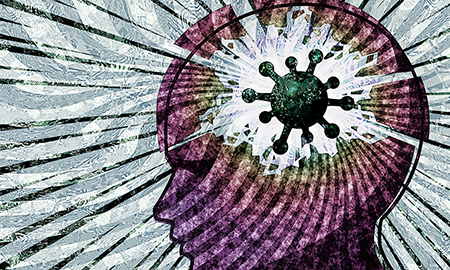Drexel Community Learns Mental Health Awareness and Response
June 22, 2021
By Lisa Ryan
A mental health first aid course from the City of Philadelphia’s Department of Behavioral Health and Intellectual disAbility Services (DBHIDS) is now available virtually. College of Medicine faculty and staff are encouraged to register for the class, which DBHIDS’s Healthy Minds Philly program brought to Queen Lane for graduate faculty members in 2019.
The eight-hour class, now split into two virtual sessions of four hours in length, teaches attendees how to understand and address signs of mental and behavioral health challenges or crises.
“In a first aid or CPR course, you’re learning how to stabilize someone in the moment of the emergency until an ambulance arrives or you can get them to a hospital, whichever they need,” said Michael Bouchard, PhD, a professor and director of the Division of Biomedical Science Programs in the Graduate School of Biomedical Sciences and Professional Studies. “The point of this training is exactly the same.”

Bouchard worked with Ipatia Daigle, academic administrator for the Division of Biomedical Science Programs, to organize enrollment of educators from across the Graduate School in mental health training. Bouchard and Daigle were motivated in this work after reflecting on the needs of post-secondary students on a national level.
“There were reports coming out over at least two or three years of a noticeable increase in suicide rates among graduate students and undergraduates,” Bouchard said. “We could see that it needed to be addressed on multiple levels, and that average faculty aren’t trained to deal with that. We’re probably more trained, in our own ways, to deal with physical first-aid crises. Helping with mental health is a totally different kind of skill.”
As Bouchard and Daigle brainstormed ways to build that skill in graduate faculty, a colleague mentioned the mental health training from Healthy Minds Philly, which offers lessons tailored to higher education community members to help them best meet students’ needs. In the end, enough faculty members signed up that Healthy Minds Philly mental health training facilitators came to Queen Lane for the session, instead of faculty going to them.
“The faculty were very enthusiastic about this,” Bouchard said. “I think we had a pretty good turnout for the first training.”
The eight-hour course combined lectures on mental health and active learning exercises – the latter helped attendees from across all three graduate school divisions to brainstorm how they would help students in various scenarios. They also went over which resources to direct students toward, and when, according to Bouchard.
“I think it was a really useful educational experience, if only to give the faculty information on what to do in the moment,” he said. “I thought personally it was very well done and very informative.”
Faculty members left the training session with information on various mental and behavioral health diagnoses and symptoms, and with an understanding of how to be a safe, supportive person for students to go to if they need help. Bouchard and Daigle have worked to make information on mental health accessible to faculty as part of their continuing education, and they think the Healthy Minds Philly training was a good starting point.
“It made us all more aware of not just talking about it, but actually making sure that we have resources and students know exactly where those are,” Bouchard said. “I think the training stimulated us to start thinking about additional training, additional resources for faculty, staff, and even students.”
Faculty, staff or students who complete the training are certified in mental health awareness and crisis response for three years, at which time they can take the training again. Bouchard keeps his certificate displayed in his office, in a place where students will see it.
“My hope is that students would see that and it would help reduce the stigma around mental health and make students aware that they could go and talk with the faculty in an emergency or other mental health situation,” he said. “We want to let the students know that we know they’re under a lot of stress, and we want to be able to provide a supportive environment without stigma.”
Faculty, staff members or students interested in Healthy Minds Philly’s mental health training can visit healthymindsphilly.org for more information.
Drexel's Employee Assistance Program is available to help employees in need of support through confidential, 24/7 counseling at 888.628.4824. This is offered at no cost to benefits-eligible faculty and professional staff, their family members, and Drexel graduate students. More information is available on the Human Resources website. Students can reach out for support via mental health services.